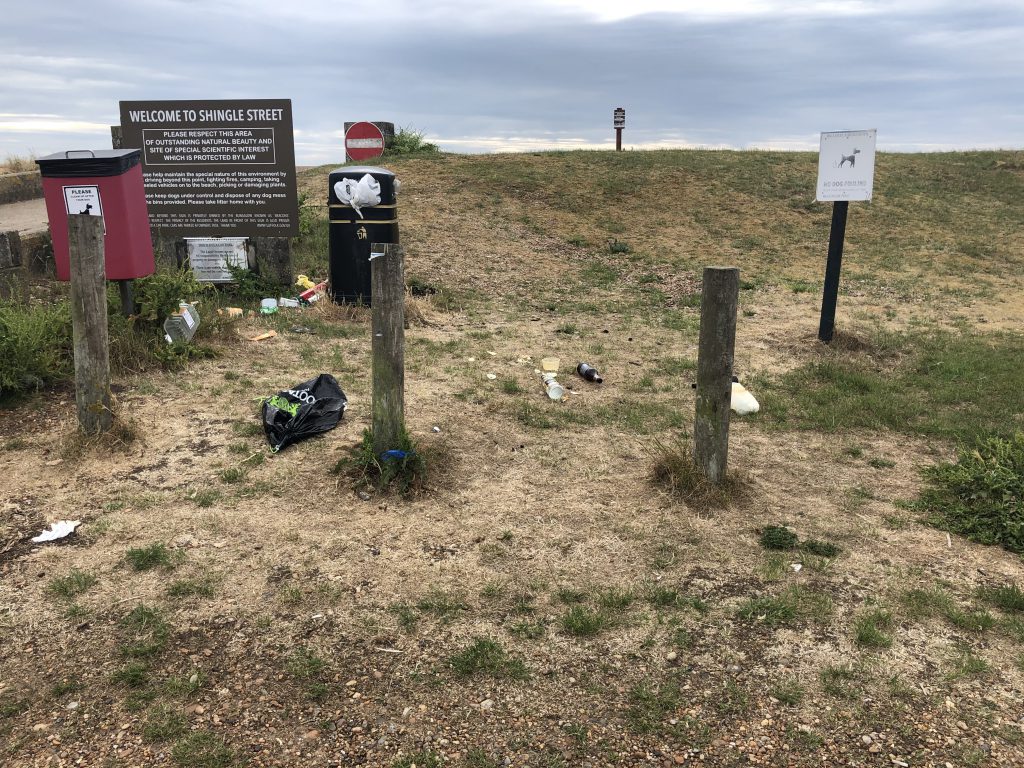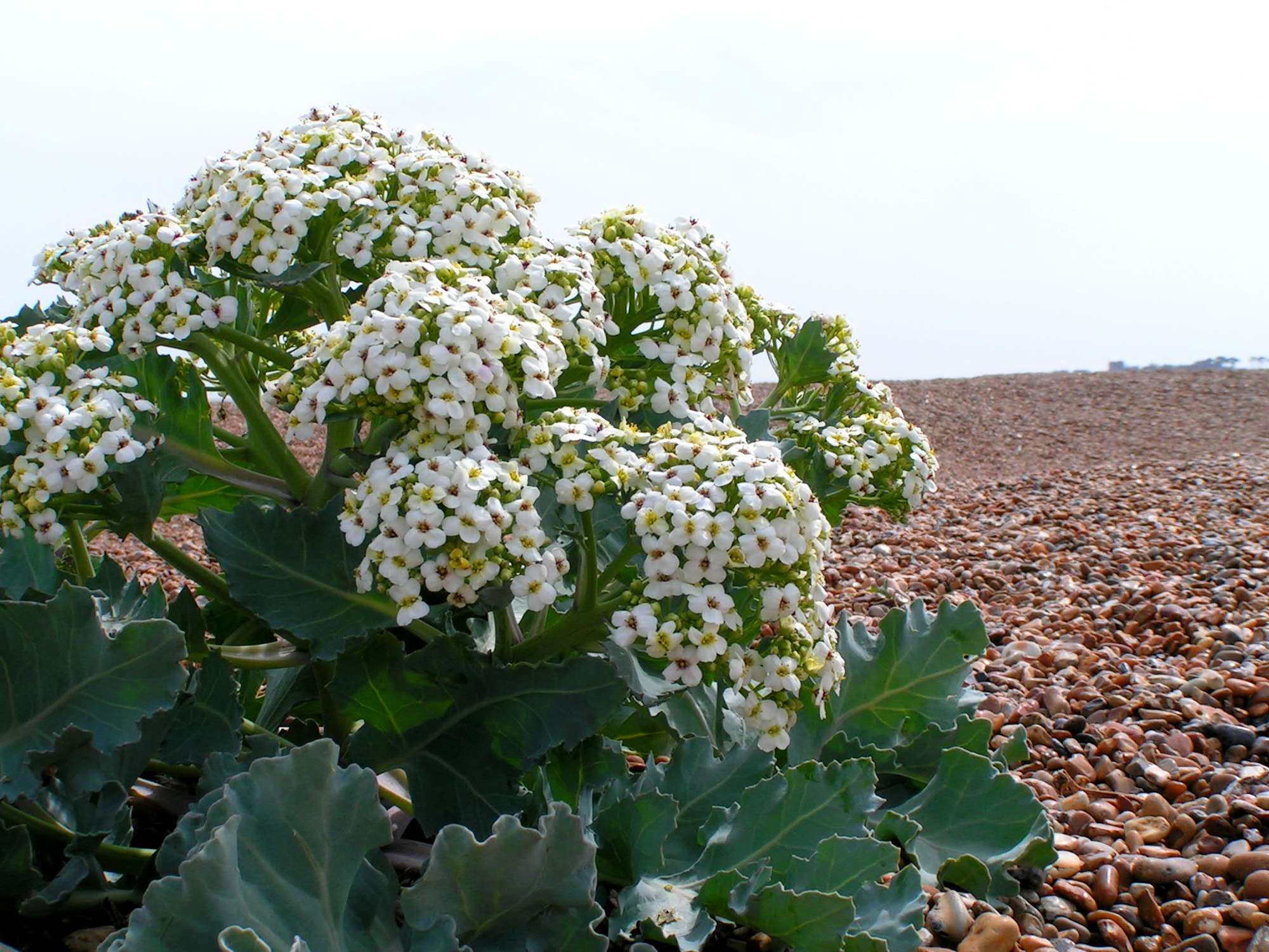As regular and long-time visitors to Shingle Street, many of you will be very aware of the significant changes we all saw last year in both the number and nature of visitors to the hamlet. Lockdown, increases in local housing and hot weather all contributed to this, and we noticed a marked shift away from the respectful leisure use of the beach towards much less considerate behaviour, with associated problems of littering, use of the natural area as toilets, damage to protected plants and landscape, and dangerous and thoughtless parking.

Problems of littering (photo: Catherine Lindsay-Davies).
The residents of Shingle Street are therefore having to consider how best we can manage growing visitor pressures into the future, so that that we can continue to welcome respectful visitors, while at the same time protecting this vulnerable landscape and its special flora and fauna. This is a unique environment, which has multiple official designations as a conservation area and which you’ll remember we described in detail in a published Biodiversity Survey a few years back. The entire beach, for example, is a Site of Special Scientific Interest (SSSI), which means it is an offence to intentionally or recklessly damage, disturb or destroy any land, flora or fauna within the site and it is the owners’ responsibility to ensure adherence to these legal protections.
All the land at Shingle Street, from the fields through the beach to the foreshore, and including the land on which visitor parking is permitted, is in fact privately owned, either by the individual householders or by the Shingle Street Settlement Company, a community-owned company set up in 1997 by the residents specifically to conserve and protect the land. So, as custodians of this small patch of wildness, we believe we now have a responsibility to create a longer-term vision for Shingle Street, which tries to strike a balance between our legal obligations to protect the environment and the rights and interests both of the residents living within the hamlet and of visitors from the wider community. Our first attempt at framing a collective vision for Shingle Street is: A wild and natural place where biodiversity is protected and enhanced, where people can respectfully experience this unique environment.
You may have noticed two recent initiatives that we have already felt obliged to take to begin responding to some of the problems mentioned above. First, we’re experimenting with mounds and ditches to protect the fragile vegetation from off-road driving and parking. We are aware that these look a little raw now, but they will soon merge gently into the landscape as the grass grows over them, and we hope in this way to avoid the need for any kind of fencing or barrier that would look alien in this landscape.
Secondly, as previously shared in Village Voices, to prevent the bins being filled up from day trips with all kinds of rubbish, which then overflows and gets blown around, we are trialling the removal of the bins at the southern end, following the example of other environmentally-sensitive locations such as Dunwich Heath. People have been dumping stuff like umbrellas, tents, furniture, and even hot BBQs (illegal on the beach, and which several times in 2020 caused bins to melt).
We previously tried increasing the bin sizes and quantity, but they filled up just as quickly, so we decided to trust our visitors to take away all they brought with them. To date, we are pleased not to have seen any increase in litter and wind-blown rubbish. Thank you to everyone for that.

Severe parking problems (contributed)
We also gratefully acknowledge the help of those of you who regularly help to clean the beach of litter and sea-borne detritus. We appreciate that you may have become used to placing this rubbish in the bins, so do get in touch if you need our help in finding other suitable receptacles for this. Please note, however, that the dog-waste bin at the start of the southern sea wall footpath has not been removed.
Like the residents, many of you have been appalled by the increase in human (as well as dog) toilet waste. It has been suggested that temporary toilets could be positioned here at peak times, but we strongly resist this proposal. We believe that would only encourage further inappropriate uses of the beach (including illegal overnight camping) and move us further away from our goal of balancing the protection and enhancement of the natural environment against the rights of residents and visitors.
We know that many of you care as passionately about Shingle Street as we do, and are equally worried about the threats to this very special place. We would welcome the ideas and help of anyone with a genuine interest in the long-term sustainability of Shingle Street, to enable us to move forward towards the vision outlined above. We will be asking our local Parish Councils and the relevant statutory and interested bodies for their input. Please either connect us through them or directly by email to: [email protected].
Tim Green, on behalf of residents (Chair, Shingle Street Settlement)








